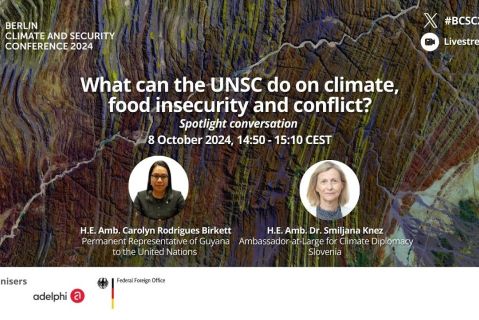
What can the UNSC do on climate, food insecurity and conflict?
When: 8 October 2024 | 14:50-15:10
Format: Spotlight conversation
Venue: Plenary session (Weltsaal)
281.6 million people or 21.5 percent in 59 countries and territories faced high levels of acute food insecurity in 2023. The unprecedented 2020-2023 drought in East Africa, El Niño- driven floods and price volatility of food supplies will continue to have lasting impact. The global food crisis is driven by converging governance, social and economic challenges. Conflict, competition for resources related to agriculture or pastorialism, political reform processes that can lead to occurrences of land grabbing, risking costs of agricultural commodities, including fertilizer, mass displacement, speculation and geo-political manipulation all combine to reinforce food insecurity and hunger. The biggest driver of hunger is still conflict, with 70 percent of the world’s hungry people living in areas affected by war and violence. Events in Ukraine illustrate how conflict feeds hunger – causing displacement, unemployment and economic devastation on a national scale.
The nexus between climate change, conflict and food insecurity and its impact on the maintenance of international peace and security was one of Guyana’s priorities for its tenure on the UNSC and used its first presidency to convene a high-level open debate to examine the impact of climate change and food insecurity on the maintenance of international peace and security on 13th and 14th February 2024. This spotlight session will share key insights and recommendations from the new report on the impact of climate change and food insecurity on the maintenance of international peace and security.
Read the full report here: adelph.it/UNSCGuyana
Speakers:
- H.E. Amb. Carolyn Rodrigues Birkett, Permanent Representative of Guyana to the United Nations
Moderated by H.E. Amb. Dr. Smiljana Knez, Ambassador-at-Large for Climate Diplomacy of Slovenia
Return to BCSC 2024's agenda

